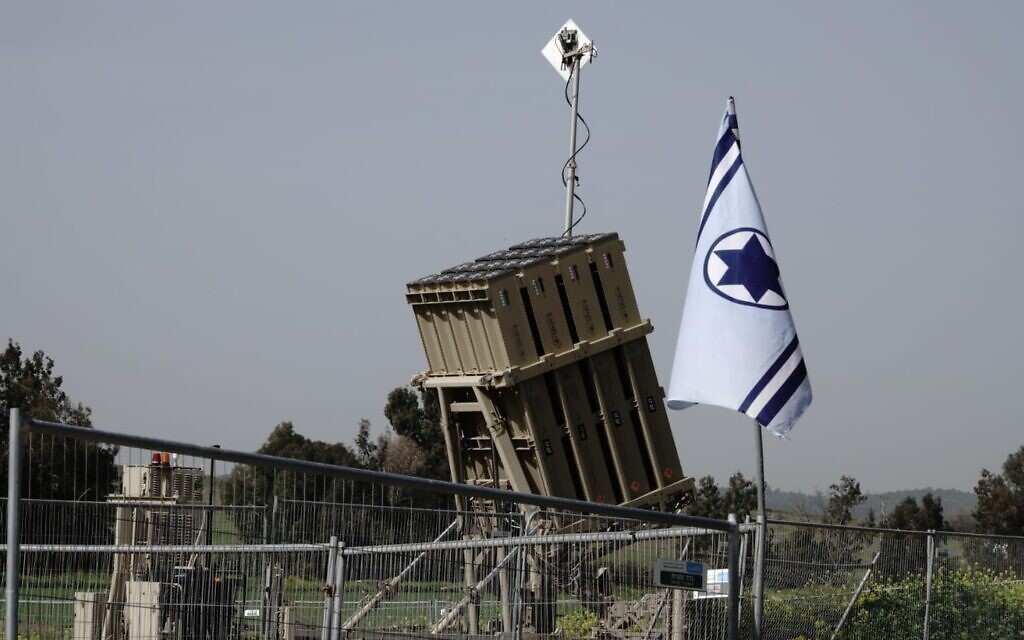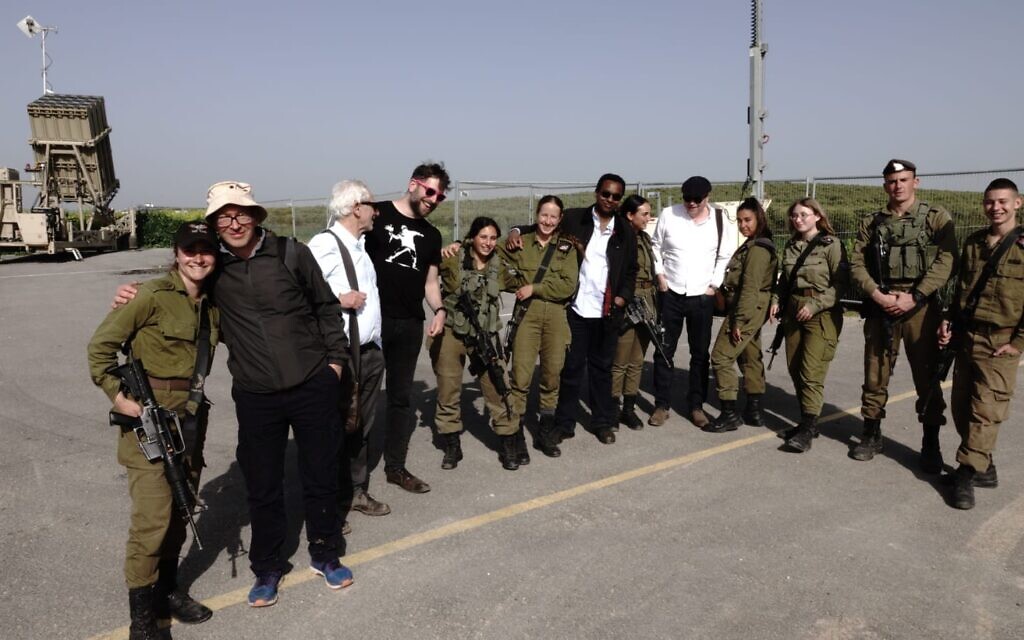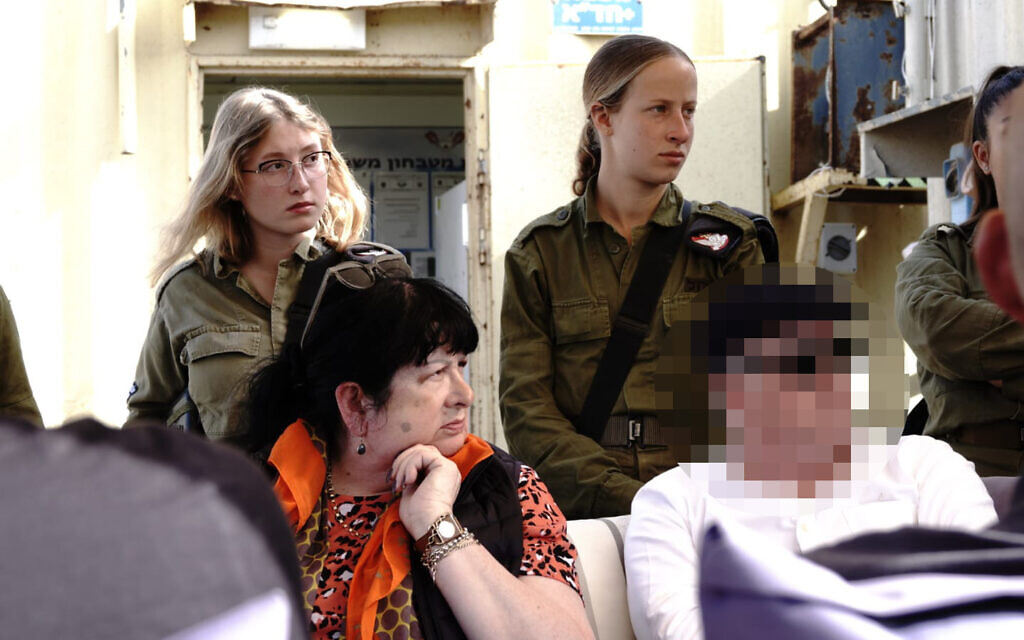SPECIAL REPORT: Meet the teens behind Israel’s Iron Dome
Jenni Frazer joins advocacy group Elnet UK to discover the Israel not seen by tourists.
Lt-Col Rotem, in his early 40s, cuts a natty figure in his immaculately pressed IDF bright blue shirt, joking about “Yes, Minister” as he briefs our group of British journalists on the intricacies of Israel’s rightly famous Iron Dome missile interceptor system.
It’s a high-level briefing — the former IDF spokesman, Jonathan Conricus, lolls watchfully nearby as we stand in hot March sunshine, in front of three Iron Dome batteries.
But then Lt-Col Rotem says: “Let me introduce you to my team”. And it is a truly jaw-dropping moment as a fresh-faced group of young soldiers, young men and women, step forward. They are all aged 18, 19, and 20, and it is their lightning speed in deploying the Iron Dome defence batteries that determines the protection of Israel’s cities when under rocket attack.
Get The Jewish News Daily Edition by email and never miss our top stories Free Sign Up
At first, I think, we can hardly believe that we are looking at such young people. We could be watching a scene from any fast-action thriller as each soldier identifies him or herself by age and first name. This is a commando unit, and though the young men have been assigned to it, the young women have volunteered.
When we catch our breath we can’t wait to ask them questions. “What’s the toughest part of this job?” I say, and one of the girls says: “It’s having to go from zero to 100 in such a short time”. By this she means that the decisions when to fire the Iron Dome have to be taken in a frighteningly short space of time — usually seconds — and we can’t even imagine the pressure put on these young people and the responsibility they bear.
“What’s the toughest part of this job?” I say, and one of the girls says: “It’s having to go from zero to 100 in such a short time”
Later, we ask one of the girl soldiers what her family thinks of her serving in such a dangerous unit. She smiles: “Both my parents are police officers and my brother also served as a commando. The tradition in our family is one of public service and giving back to Israel. We are all proud of each other”. These are rare, but genuine sentiments. Our group leaves the Iron Dome installation extraordinarily impressed.
This visit, and an exciting helicopter flight to the north of Israel earlier in the day, was part of an intensive programme on the first mission to Israel under the auspices of Elnet UK.

The advocacy organisation has operated since 2007 in Paris, Berlin, Brussels and Warsaw. London became the fifth Elnet location in June last year, with the former Labour MP Joan Ryan named as director.
Elnet is a new name to the Jewish community in the UK but is familiar in Israel, allowing this first mission to offer a programme full of impressive speakers and locations. As the Israeli Arab journalist Khaled Abu Toameh drily observed at a meeting at the Jerusalem Press Club, it’s often remarked that “this is a good time to visit Israel” — because events conspire to hit the headlines.
As the country emerged from an uncomfortable, two-year pandemic period without foreign visitors, there were indeed news events to secure the attention of even the most cynical of journalists, from the remarkable Negev Summit hosted by Foreign Minister Yair Lapid to the tragic attacks in Beersheva, Hadera and B’nei Brak.
All the remarkable “talking heads” lined up to brief we journalists shared a certain consensus: Israel’s dependence on Russia, to allow the Jewish state to attack targets in Syria, put it in an awkward place vis-a-vis the possibility of armed help for Ukraine; the current signatories to the Abraham Accords — the UAE, Bahrain, and Morocco — are unlikely to be the last, and two somewhat startling names were put forward as the next candidates, Indonesia and Qatar. The big prize, Saudi Arabia, is being assiduously courted by Israel, but may be more dependent on America’s support. Since President Joe Biden reportedly cannot bring himself to speak to Saudi Arabia’s Crown Prince Mohammed Bin Salman, because of human rights abuses, this may remain on the back burner for a time.
The common enemy of most actors in the region remains Iran, and many of our briefers agreed that one of the most remarkable speeches at the Negev Summit was given by the UAE foreign minister, Sheikh Abdullah Bin Zayid, calling the event “historic” and one that marked a change in narrative in the Middle East.
There was near universal praise, too, for Mansour Abbas, leader of the United Arab List in Israel’s coalition government, lauded by political opponents and allies, not least for his unprompted and forthright condemnation of the terror attacks for which Isis had claimed credit.
There were some difficult encounters during our trip, not least a visit to the Barkan Industrial Area in the West Bank, where an overly avuncular Israeli kibbutznik, the export manager in charge of a group of three factories, tried to paint a picture of harmonious Jewish and Palestinian worker co-operation, which verged on the condescending and the patronising. We met one of the Palestinian workers, Sofiane Dagar, whose daughter has become a doctor, a real success story. But it was hard to tell through the prism of translated conversation and “Moshe’s” presence what Mr Dagar might have said to our group of journalists. Certainly he might legitimately have objected to being discussed as though the Palestinian workers were ignorant house pets.
There were some difficult encounters during our trip, not least a visit to the Barkan Industrial Area in the West Bank
More productive was a visit to the West Bank’s Tura Winery, run by Vered and Erez Ben-Sa’adon. Vered’s remarkable personal story encapsulates so many aspects of the Israeli narrative, bringing into play the Holocaust, conversion, and an implacable belief in Jewish historical claims to the land of Israel. She is a Dutch convert to Orthodox Judaism, whose Jewish grandmother survived the war in Holland by hiding, like Anne Frank, and also keeping a diary. Liesje de Vries, Vered’s grandmother, married a Holocaust survivor and had two sons with him.

But when her first husband died, Liesje remarried, this time to a Dutch non-Jew, a widower who had a daughter. And one of the sons from the Jewish marriage fell in love with his non-Jewish stepsister. Eventually the whole family came to Israel and converted. Now the Ben-Sa’adons have five children, the elder two of whom are senior IDF officers; and Vered often tells her life story to the winery visitors, in the hope that she can, perhaps, change people’s prejudices about life on the other side of the Green Line.
For me, the strongest moments came in an unexpected conversation with “Yoel”, a member of Kibbutz Netiv Ha’Assara on the border with Gaza. All Yoel wants is for the army to take decisive action against Hamas and obliterate its rocket fire against the kibbutz and the south of Israel. He takes us out to a lookout point by the kibbutz where we can see the poly tunnels for its tomatoes and peppers, and beyond that the deadly bases of Hamas, lurking in Gaza to cause maximum destruction.
It’s when he talks about his 16-year-old son ducking down and bending double inside the family home, every time he had to walk past a window — for fear of a rocket attack — that I find the most difficult to hear. His son, Yoel says, thought about avoiding army service altogether, but eventually did join up and was glad that he had done so.
Yoel and I don’t agree, because I don’t believe this is a safe place to bring up a family, but I can scarcely sit in judgment on him. He is desperate for a peaceful life and though we are arguing, he is gracious enough to conclude our conversation with a really warm and heartfelt hug. He is the best of Israel, along with those soldier teens we met near Sderot. It was a privilege, thanks to Elnet, to meet them.

Thank you for helping to make Jewish News the leading source of news and opinion for the UK Jewish community. Today we're asking for your invaluable help to continue putting our community first in everything we do.
For as little as £5 a month you can help sustain the vital work we do in celebrating and standing up for Jewish life in Britain.
Jewish News holds our community together and keeps us connected. Like a synagogue, it’s where people turn to feel part of something bigger. It also proudly shows the rest of Britain the vibrancy and rich culture of modern Jewish life.
You can make a quick and easy one-off or monthly contribution of £5, £10, £20 or any other sum you’re comfortable with.
100% of your donation will help us continue celebrating our community, in all its dynamic diversity...
Engaging
Being a community platform means so much more than producing a newspaper and website. One of our proudest roles is media partnering with our invaluable charities to amplify the outstanding work they do to help us all.
Celebrating
There’s no shortage of oys in the world but Jewish News takes every opportunity to celebrate the joys too, through projects like Night of Heroes, 40 Under 40 and other compelling countdowns that make the community kvell with pride.
Pioneering
In the first collaboration between media outlets from different faiths, Jewish News worked with British Muslim TV and Church Times to produce a list of young activists leading the way on interfaith understanding.
Campaigning
Royal Mail issued a stamp honouring Holocaust hero Sir Nicholas Winton after a Jewish News campaign attracted more than 100,000 backers. Jewish Newsalso produces special editions of the paper highlighting pressing issues including mental health and Holocaust remembrance.
Easy access
In an age when news is readily accessible, Jewish News provides high-quality content free online and offline, removing any financial barriers to connecting people.
Voice of our community to wider society
The Jewish News team regularly appears on TV, radio and on the pages of the national press to comment on stories about the Jewish community. Easy access to the paper on the streets of London also means Jewish News provides an invaluable window into the community for the country at large.
We hope you agree all this is worth preserving.
-
By Brigit Grant
-
By Laurent Vaughan - Senior Associate (Bishop & Sewell Solicitors)
-
By Laurent Vaughan - Senior Associate (Bishop & Sewell Solicitors)
-
By Laurent Vaughan - Senior Associate (Bishop & Sewell Solicitors)
-
By Laurent Vaughan - Senior Associate (Bishop & Sewell Solicitors)






















